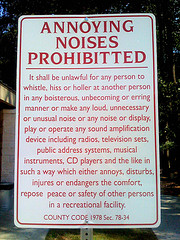Georgia Supreme Court Overturns Restraining Order That Was Harmful to Online Communities

Credit: Patrick Fitzgerald (CC BY 2.0)
Just over two years ago, I wrote about a restraining order issued in the state of Georgia, which was harmful to online communities. The order was requested by author Linda Ellis and targeted at Matthew Chan. Chan is the creator of ExtortionLetterInfo, an online resource and community that discusses (and criticizes) settlement demand letters issued by copyright holders.
Ellis authored a poem, “The Dash,” and has a reputation for aggressively pursuing those who share it online. According to Chan’s interview with Ars Technica in 2013, he was contacted by someone that Ellis had threatened. Instead of paying Ellis, they opted to pay Chan to publicize the incident. He used his website to criticize Ellis.
Unfortunately, some of Chan’s criticism verged into seriously creepy behavior. Quoting from my original story, these are some of the statements he made, taken from Chan’s own response to Ellis’ request for a restraining order.
“I could even find your house to see what it looks like and where you live,” Chan writes in one post. “Don’t worry I won’t trespass or threaten any physical harm. But I definitely would get some video footage of your house from a safe distance and maybe provide directions to your house. Remember, as a self-proclaimed public figure and celebrity author, this would be of public interest. I could be a one-man paparazzi.”
“Believe me when I tell you I have a LOT on you,” he says in another. “I found out about your brother but I have a LOT more personal information on YOU that I don’t really want to post. I don’t even want to say what information I have simply because it can get out of control very quickly. There are people who hate you and looking to put you into the ground. I don’t ‘hate’ you. I simply find your copyright extortions to be outrageous. We may never agree but that is OK. I do have information that I can post that I am certain you would like and not do you well. But I will leave a few nuggets to let you know I mean business. Some of this will mean very little to most people but YOU should “get it.”
This is followed by a list of names and what appear to be places or organizations. “Just so you know, my patience is fairly low,” he continues. “It wouldn’t take much to push me over the edge on this. I am content to leave this post as it is if you quietly back off and stop harassing and threatening people. But if not, you will find this thread become one of the most active threads you have ever seen.”
Like I said: creepy. A legitimate discussion and criticism of copyright trolling (which I am no fan of) should never include that sort of discourse. When you do so, you lose the high ground.
Managing communities for as long as I have, I’ve dealt with people who directed these types of remarks at me. Most of them are just trying to frighten, which can still be damaging, but you never know who will be the one that goes from vaguely creepy, non-specific threats to actual, physical danger. With Chan making these comments himself, it is easy to see how the community would have joined in, making similar remarks. Chan’s lack of responsibility for his words and his community created a situation that threatened more legitimate online communities.
This came in the form of an order by Judge Frank Jordan, who held that Chan was not only responsible for his posts, but the posts that were made by members of his community. The judge demanded that “all posts related to Ms. Ellis” be removed. Not just Chan’s posts, not just posts that threatened Ellis, but all posts mentioning her.
This is bad because it flies in the face of the Communications Decency Act, which protects U.S.-based community managers and owners from liability for remarks made by other people within their community. The judge had made Chan responsible for posts made by others, seemingly a violation of the act.
At the time, I wasn’t overly concerned with the ruling because it was pretty clearly erroneous. I doubted it would stand, if challenged. For that reason, I almost didn’t write about the story at all, but did so because I wanted to make the larger point that irresponsible community owners can be a threat to all of us. If we don’t tend our own gardens, someone else may very well do it for us, creating more problems along the way.
At the end of March, the restraining order was officially overturned by the Georgia Supreme Court. That’s good news. You don’t have to support Chan’s tactics to understand that the order was problematic for online communities.
